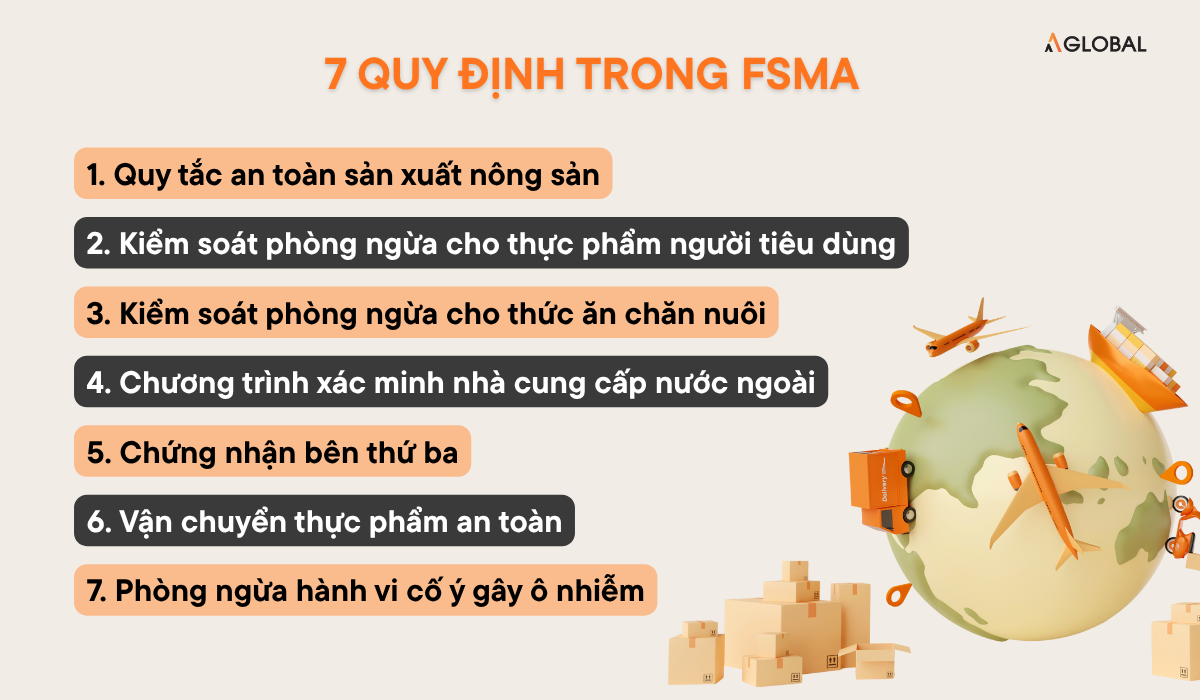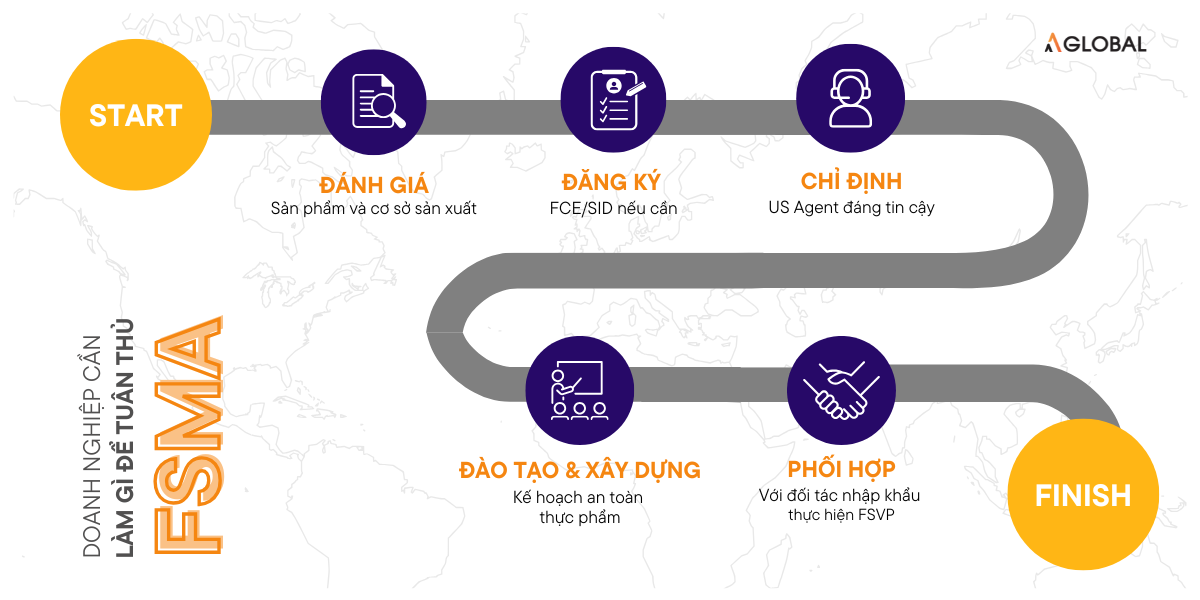
What is FSMA? FDA standard export solution for businesses
The US market is increasingly tightening regulations on imported food quality, making compliance with FSMA a mandatory requirement for Vietnamese businesses. The article below will help you understand what FSMA is and the steps needed to expand export opportunities to the US.
1. What is FSMA?
FSMA (Food Safety Modernization Act) is the Food Safety Modernization Act enacted by the US Food and Drug Administration (FDA) in 2011. It is considered the largest reform in the US food safety management system in over 70 years.
Read more: What is FDA? Conditions to meet FDA standards
FSMA is a law that establishes new regulations to prevent food safety risks from the start, rather than merely responding when incidents occur. The law requires businesses to demonstrate risk control processes, supplier monitoring, and ensure the entire supply chain meets the standards for import into the US.
In other words, FSMA is a “mandatory passport” for any business wishing to export food to the US.
Objectives of FSMA
FSMA is designed to:
- Shift focus from reaction to prevention of food hazards.
- Strengthen supply chain monitoring from raw materials, production, packaging to transportation.
- Increase business accountability in ensuring product quality.
- Reduce the risk of food recalls and protect the health of US consumers.
- Prevent substandard food from entering the market.
As a result, FSMA has become a key standard for businesses to build a professional and sustainable food quality control system.
Entities Subject to FSMA
FSMA applies to all organizations involved in the production, processing, packaging, storage, and distribution of food intended for the US market, including:
- Food production or processing businesses within the US.
- Foreign businesses (including Vietnam) exporting food to the US.
- Raw material suppliers, logistics companies, cold storage, and transportation units.
- Facilities must be registered with the FDA.
This means any Vietnamese business wishing to export food to the US must comply with FSMA, regardless of size.
Read more: Exporting goods and things you need to know
2. Why is FSMA important for exporting businesses?
To export to the US market, businesses need not only high-quality products but also to meet strict management standards. FSMA is the determining factor in whether a business can access and maintain this market.
2.1. FSMA is a mandatory legal requirement for exporting to the US
For any business wishing to bring food into the US market, FSMA is not optional but a mandatory condition. It is a food safety law enforced by Washington for all businesses producing, processing, packaging, or storing food before it is sold in the US.
This means Vietnamese businesses must demonstrate that their products are safe, production processes are controlled, and preventive risk plans are in place. Failure to meet FSMA requirements can result in shipments being held, returned, or the business being prohibited from exporting to the US.
In other words, FSMA is the “ticket” that allows your products to pass through strict US controls and be eligible for legal export.
2.2. Supply chain risk management under FSMA
FSMA requires exporting businesses to control risks at every stage of the supply chain, from raw materials and production to transportation. The FSVP (Foreign Supplier Verification Program) is a key mechanism: US importers must verify that foreign suppliers truly meet US food safety standards.
This means Vietnamese businesses need clear procedures for risk assessment, hazard control, traceability records, and safe production capabilities. When businesses do this well, importers can easily approve them under FSVP, ensuring a smooth export process.
Read more: How to sell abroad and the risks to be aware of
2.3. FSMA creates a competitive advantage & market expansion
Compliance with FSMA is not just about following the law—it is a great opportunity for businesses to enhance competitiveness. When Vietnamese businesses meet FSMA’s strict standards, they not only open the “door” to the US but also prove credibility and quality to international customers.
In practice, meeting FSMA requirements allows many Vietnamese businesses to expand not only to the US but also to other markets with high standards. Furthermore, strict FSMA management can become a branding advantage: businesses can use FSMA compliance as a selling point to persuade demanding partners and customers.
2.4. Enhancing internal monitoring & expertise
Applying FSMA requires businesses to upgrade internal monitoring capacity and professional resources. Specifically, businesses must appoint a PCQI (Preventive Controls Qualified Individual) with deep knowledge to develop and supervise food safety plans—this is an essential FSMA requirement.

PCQI Certification
Additionally, FSMA requires businesses to establish monitoring systems, corrective actions, and periodic evaluations to ensure preventive measures remain effective.
Investing in such systems not only ensures FSMA compliance but also builds professional, transparent workflows—a solid foundation for sustainable development in international trade.
3. 7 main regulations in FSMA
Here are 7 main FSMA regulations that exporting businesses need to understand as they directly affect customs clearance and cooperation with US importers.
3.1. Produce Safety Rule
Applies to fresh fruits and vegetables, setting mandatory standards from cultivation, harvesting, and packaging to storage. Includes controlling contamination risks from water, fertilizers, grazing land, as well as hygiene and health training for employees.
3.2. Preventive Controls for Human Food
Food production facilities must comply with current Good Manufacturing Practices (cGMP) and develop food safety plans, analyze risks, and implement preventive measures. Facilities must also have recall plans if hazards are detected.
3.3. Preventive Controls for Animal Food
Similar to human food, animal feed facilities must apply cGMP, create food safety plans with risk analysis and preventive measures, and prepare recall plans if hazards are found.
 7 Key Provisions in FSMA
7 Key Provisions in FSMA
3.4. Foreign Supplier Verification Programs (FSVP)
US importers must conduct risk-based checks to verify that imported food is produced in compliance with FSMA standards. This includes approving suppliers, evaluating performance, and identifying potential risks.
3.5. Accreditation of Third-Party Auditors/Certification Bodies
A voluntary program for FDA-recognized independent certification organizations to audit food safety and certify foreign facilities and their products.
3.6. Sanitary Transportation of Human and Animal Food
Mandatory for transporters, receivers, and loaders in the logistics chain to ensure food safety from “farm to table,” including maintaining hygiene, controlling temperature, and preventing contamination during transport.
3.7. Mitigation Strategies to Protect Food Against Intentional Adulteration
Aimed at preventing deliberate contamination that could harm public health. All food facilities must develop and implement comprehensive protective plans covering the entire process from production to consumption.
4. What should businesses do to comply with FSMA?
Compliance with FSMA is not merely an administrative procedure—it requires businesses to carefully prepare processes, records, and food safety management capacity. Here is a basic roadmap for Vietnamese businesses exporting food to the US.

Các bước doanh nghiệp cần làm để tuân thủ FSMA
4.1. Assess products and production facilities
Businesses must first determine whether their products and production facilities fall under FDA and FSMA jurisdiction. This step is crucial because only FDA-compliant products and facilities are allowed to export to the US.
The assessment should review food type, processing procedures, and raw materials, ensuring facilities meet basic food safety standards.
4.2. Register FCE/SID if required
For processed food or food imported into the US, businesses must complete FCE (Food Facility Registration) or SID (Submission Identifier) procedures with the FDA before exporting.
This helps the FDA track and manage foreign facilities and is mandatory for product importation. Businesses must complete online registration, update information periodically, and ensure records are always valid.
4.3. Appoint a reliable US Agent
Each foreign business exporting food to the US must have a US Agent—an official representative to communicate with the FDA in the US. The US Agent assists in receiving FDA notifications, coordinating inspections, or recalls if necessary.
Businesses should choose a reputable US Agent familiar with FDA processes to avoid errors and ensure timely communication.
4.4. Training and food safety plan development
FSMA requires businesses to have at least one staff member certified as a PCQI to develop and supervise the food safety plan. This staff member conducts hazard analysis, identifies preventive controls, and guides facility employees to follow proper procedures.
Food safety plans must be regularly updated and all records kept fully and transparently for FDA inspection.
4.5. Coordinate with import partners to implement FSVP
FSVP requires US importers to verify that imported products meet FSMA standards. Exporting businesses must work closely with import partners to provide documentation, certifications, and production process information.
If inexperienced, businesses can authorize professional consulting units to implement FSVP, ensuring all risks are managed and legal requirements are fully met.
5. Conclusion
Compliance with FSMA is the key for businesses exporting food to the US to ensure safety, enhance credibility, and expand market opportunities. Understanding the regulations and fully implementing compliance steps will help your products meet international standards and create sustainable competitive advantages.
AGlobal – the best cross-border e-commerce solution for businesses.
Register for free 1-on-1 consultation tailored to your industry and business Here!
